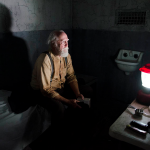As I was lamenting to a friend several weeks ago about my inner urge to write fiction again, but struggling to find the time, she directed me to NaNoWriMo, or rather, National Novel Writing Month. Unbeknownst to me, this November event has been going on for years, and it was created to jumpstart writers into what seems like the impossible: writing an entire novel in a month. Naturally, it would most likely only be a rough draft of a novel, but as the site says, it might just be the “kick in the pants” you need to get started.
Why should Christian writers participate in NaNoWriMo?
When I consider that question, one of my favorite C.S. Lewis essays comes to mind, “Learning In War-Time.” Lewis makes the case why choosing to study at the university, instead of enlisting during a time of war is a worthy option. This is particularly interesting, because it wasn’t any old war, it was World War II, and the advancing forces were a great threat in Europe. In the midst of it, Lewis argues that even as culture is being endangered, “Human culture has always had to exist under the shadow of something infinitely more important than itself,” and then he writes:
“We have to inquire whether there is really any legitimate place for activities of the scholar [or in this case, the creative writer] in a world such as this. That is, we have always to answer the question, ‘How can you be so frivolous and selfish to think about anything but the salvation of human souls?’”
Or also in that context, think of anything other than the war. Or in our context, write an entire novel in a month when it could be argued there are probably lots more important things to do.
Because Lewis was addressing an audience under the extreme pressure of war and the reality of death, he could make his point very clear. Whether or not there’s war or peace, human culture will exist; it’s just a matter of what kind of culture and the quality of the culture. Abandoning all thought of cultivating culture, even under the dire threat of war doesn’t save the culture (from possible destruction), but assures its diminishment. As Lewis observes:
“There is no question of a compromise between the claims of God and the claims of culture, or politics, or anything else. God’s claim is infinite and inexorable. You can refuse it, or you can begin to try to grant it. There is no middle way. Yet in spite of this it is clear that Christianity does not exclude any of the ordinary human activities.”
Point blank: everything must be done for God’s glory. Participating in and cultivating human culture, especially the culture that we can affect and influence, is important. The value lies in the understanding that if Christians, Christ’s transformative presence in the world, abandon and ignore the culture, it won’t make it go away, and it certainly won’t improve it. It will only change the kind of culture that exists around us. As Lewis points out, “If you don’t read good books, you will read bad ones. If you don’t go on thinking rationally, you will think irrationally. If you reject aesthetic satisfactions, you will fall into sensual satisfactions.” Therefore, it could also be concluded that skillful and thoughtful Christian creative writers make a difference in society by participating in cultural events such as NaNoWriMo.
Do not mistake this to mean that Christian writers should enter as a platform to evangelize or proselytize or just write overtly Christian stories. That’s not cultivating a better culture, but using it as a means to another end. That lacks the sincerity, integrity and humility to love culture and respect creation and the creative process in the same way our Heavenly Father did when he created all things. The act of creating the universe, the beauty and design were acts of joy and climaxed with ultimate satisfaction, the creation itself. That reality reveals the very character and nature of God in relationship and in community (the godhead) whilst in the act of creating. He said it was good.
That finally leads me into the topic of delight and taking advantage of the resources at our disposal to love God and the community. As Tim Keller writes in his book, Every Good Endeavor,
“A biblical understanding of work energizes our desire to create value from the resources available to us. Recognizing the God who supplies our resources, and who gives us the privilege of joining in as cocultivators, helps us enter into our work with a relentless spirit of creativity.”
We don’t need to reinvent the wheel, but look around in our communities and see where God is already at work and join in the redemptive process as it’s already unfolding in society. This is a delightful work. As a creative writer, this gets my blood pumping. I’m still awed to fully understand how it could be that I’m invited to such participation that encompasses all at once both the world I’m in and his kingdom work.
“Yet he invites us to continue his work of developing creation, to develop all the capacities of human and physical nature to build a civilization that glorifies him. Through our work we bring order out of chaos, create new entities, exploit the patterns of creation, and interweave the human community. So whether splicing a gene or doing brain surgery or collecting the rubbish or painting a picture, our work further develops, maintains, or repairs the fabric of the world. In this way, we connect our work to God’s work.”
So it is worthy work to stretch those creative fingers and flip open that laptop and start clicking away at a new story and by so doing delight in imaging the Creator in his joyful work. NaNoWriMo might just be the community of support you need and the community you can rally behind as you immerse yourself in a world of creativity. Not only are you connecting with the world, but also with God, and as such, connecting the world to God.












